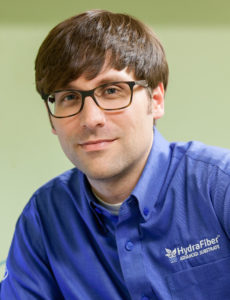Equipping Growers with Towering Substrate Solutions
My path into the horticulture business goes back to when I was 5 years old. Like most kids that age, I never wanted to be left out of any activity, especially if it was something my older brother was doing. So when he decided to get involved with 4H, I wasn’t far behind. When he joined the local horticulture club, I was next to him signing up. When he started entering gardening contests, I was competing beside him.
 Looking back all these years later, I have him to thank for cultivating my passion for horticulture. If he hadn’t included me in his interests all those years ago, I might be on a completely different career path.
Looking back all these years later, I have him to thank for cultivating my passion for horticulture. If he hadn’t included me in his interests all those years ago, I might be on a completely different career path.
Now, in my work for HydraFiber, I strive to bring that same inclusiveness and attentiveness to growers all around the world. Every day, we’re developing wood fiber substrate solutions for growers of any size and providing them with better plants and better margins, regardless of the equipment, labor, and setup they have in their greenhouse. A big part of how we’ve been able to reach that goal is by working directly with growers and listening to their unique operations.
When we first brought HydraFiber to the market in 2015, we were met with skepticism. Up until a few years ago, there hadn’t been much disruptive innovation in the substrate world. Let’s face it, substrates have never been the most attractive aspect of the horticulture industry, and for a long time, they were thought of as just a mix of different raw materials with a race to the bottom on price. However, we were able to show, from a technical perspective, why particular types of wood fiber substrates work, why they’re safe and why they’re even better — not only for the plants, but also for the environment.
An Ongoing Conversation
As the senior R&D and technical specialist manager at HydraFiber, I often talk with growers to learn about the industry challenges they face, and then we tackle those challenges in our R&D greenhouses. Through these conversations, I quickly found that no two growers are exactly alike and as I learned about each unique operation, I was able to recommend best formulations, offer product advice, and promote best cultural practices.
Having those conversations helps build trust in a way like nothing else can, and by including more customers in the conversation, we’re developing more inclusive products that can meet the needs of more growers.
As we’ve had these conversations over the years, one of the things we continued to hear was that growers wanted an option for our wood fiber substrate that didn’t require specialized equipment. All HydraFiber substrates are shipped as compressed material to lower shipping costs and save on storage space. When HydraFiber’s original product, Ultra, was initially developed, the highly compressed bales (13:1) required a specialized processing unit for blending. While this is still the most effective way to maximize the cost benefits of HydraFiber, we realized that adding a new piece of equipment isn’t an option for everyone.
A Solution For Every Grower
As we talked with growers, we took their feedback and began to brainstorm ways to make the benefits of HydraFiber available to anyone who wanted to try it.
That led us to our latest innovation: HydraFiber EZ Blend 95 cubic-foot towers and HydraFiber Ultra 95 cubic-foot towers in T160 and T365 formulations. The chemical and physical properties of the products are identical to those sold in individual bales, but the towers require no special equipment and can quickly and seamlessly be added into existing operations with minimal production changes. Growers who pad mix or use bale busters or ribbon blenders in their operations will find success with the towers without having to increase their labor or costs.
The EZ Blend tower is compressed at a 4:1 ratio, providing a total yield of about 400 cubic feet, and Ultra towers are compressed at a 6:1 ratio, providing a total yield of about 600 cubic feet. Regardless of the HydraFiber tower you choose, the product provides a better yield than conventional raw material towers. This is especially important when considering freight efficiency. You’ll need fewer truckloads of HydraFiber to achieve the same yield as conventional raw materials, which lends itself not only to lower costs, but also to helping the environment.
With these towers, I truly feel we’re one step closer to having a substrate solution for every grower. I’m energized when I get to talk to customers who now have the chance to try a wood fiber substrate for the first time. Sometimes I wonder if that’s how my brother must have felt when he was introducing me to my first plants, guiding me in my first 4H competition or helping me to learn as much as I could about this industry. I think back to how we shared in the excitement of seeing our seeds grow into award-winning plants. Since then, I’ve been able to share in that excitement with hundreds of growers. And I can only hope that with these towers, I’ll have the opportunity to share it with hundreds more.


 Video Library
Video Library 




















